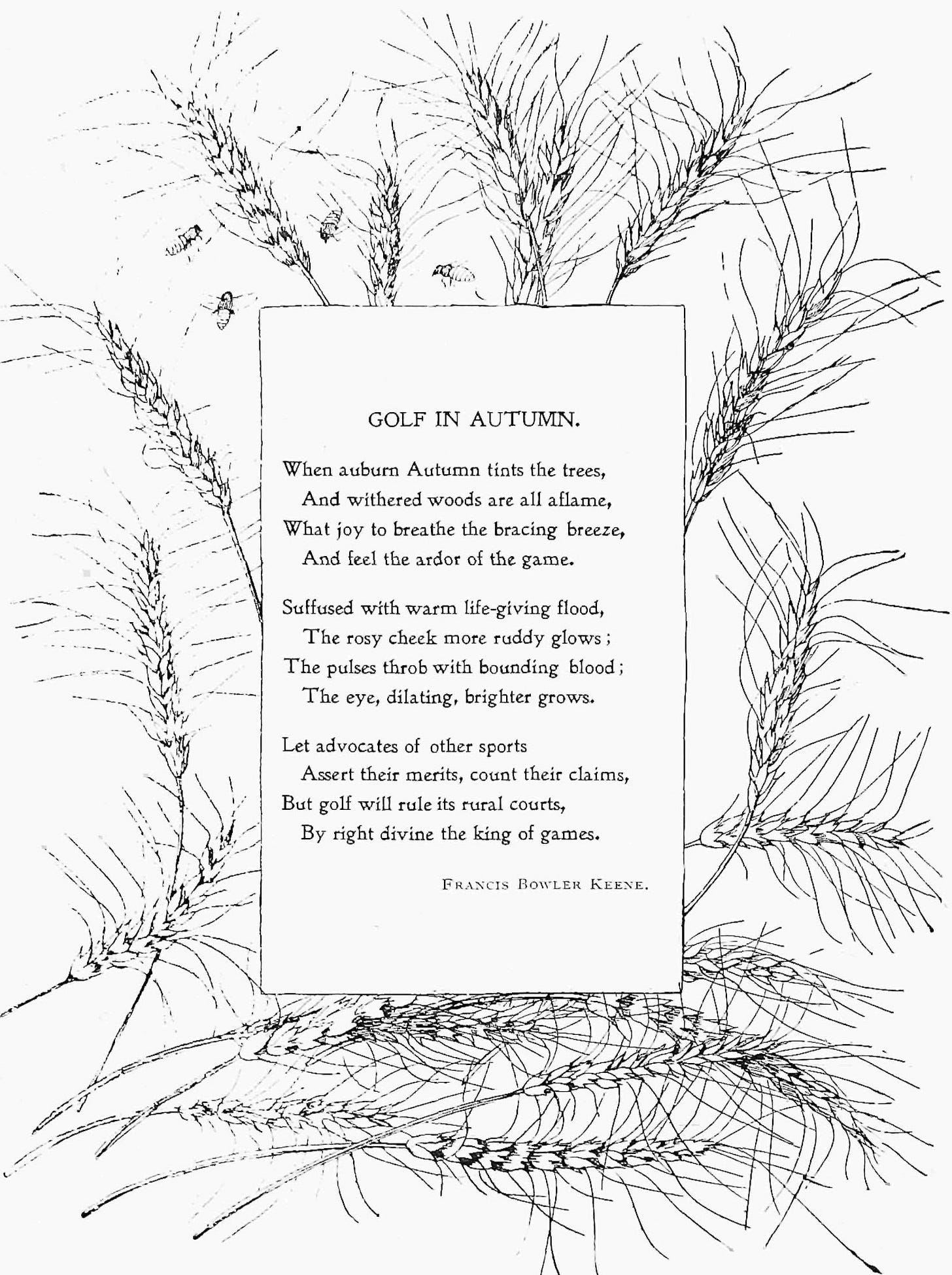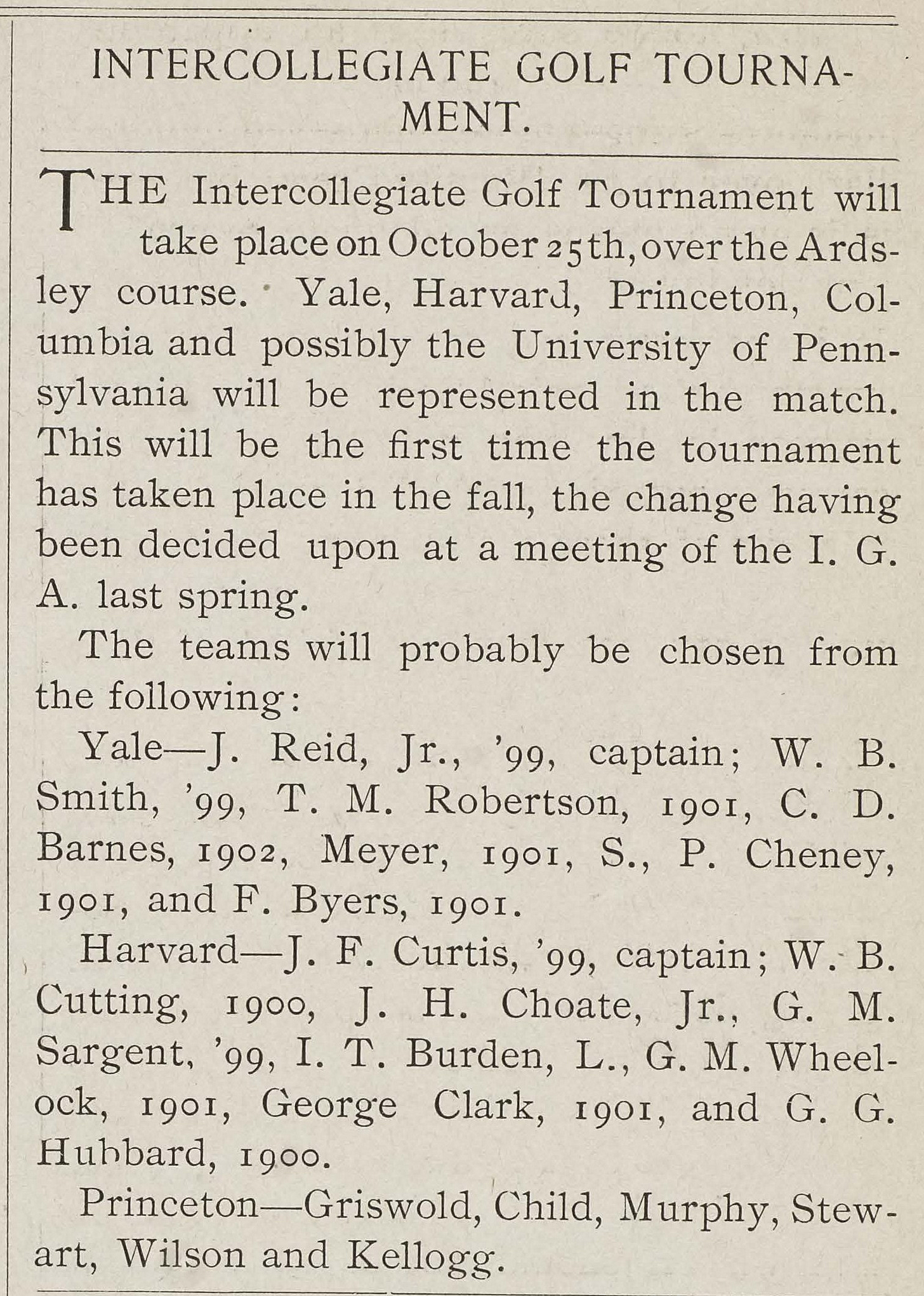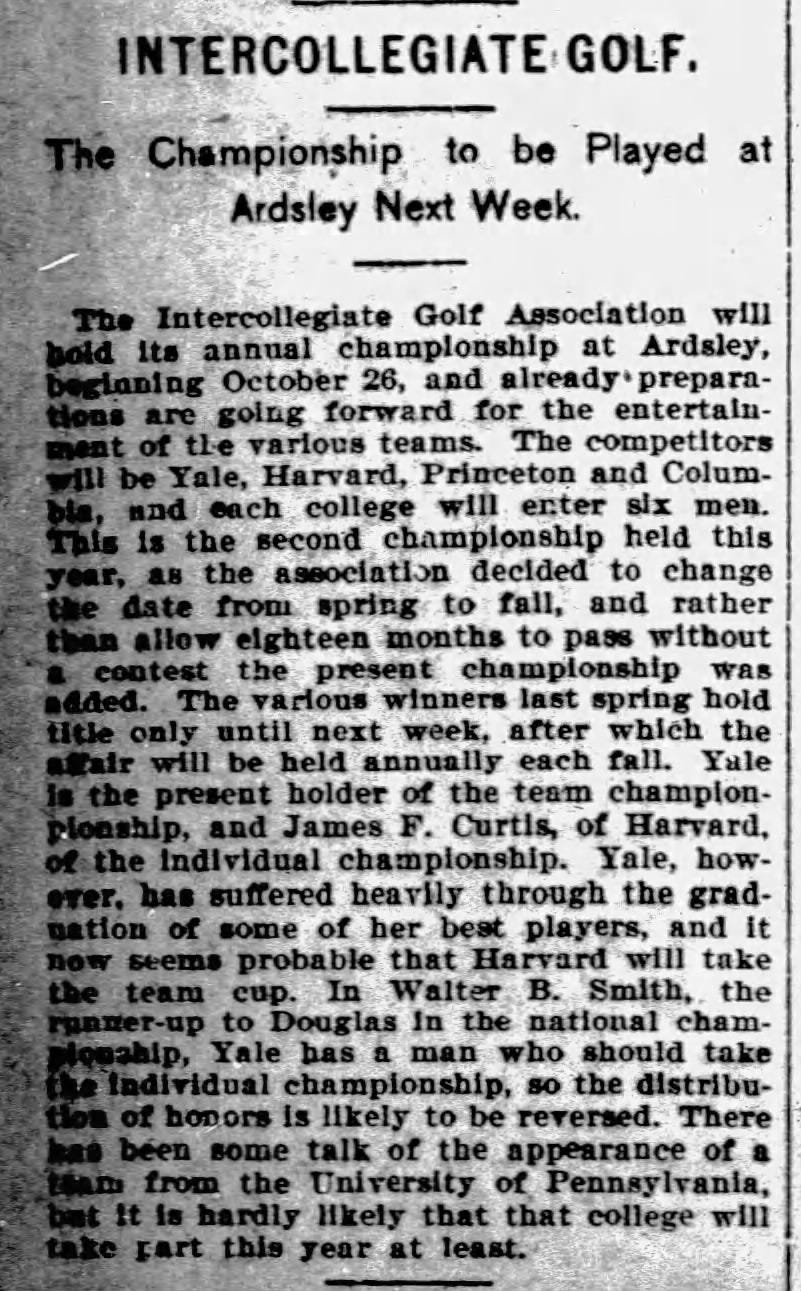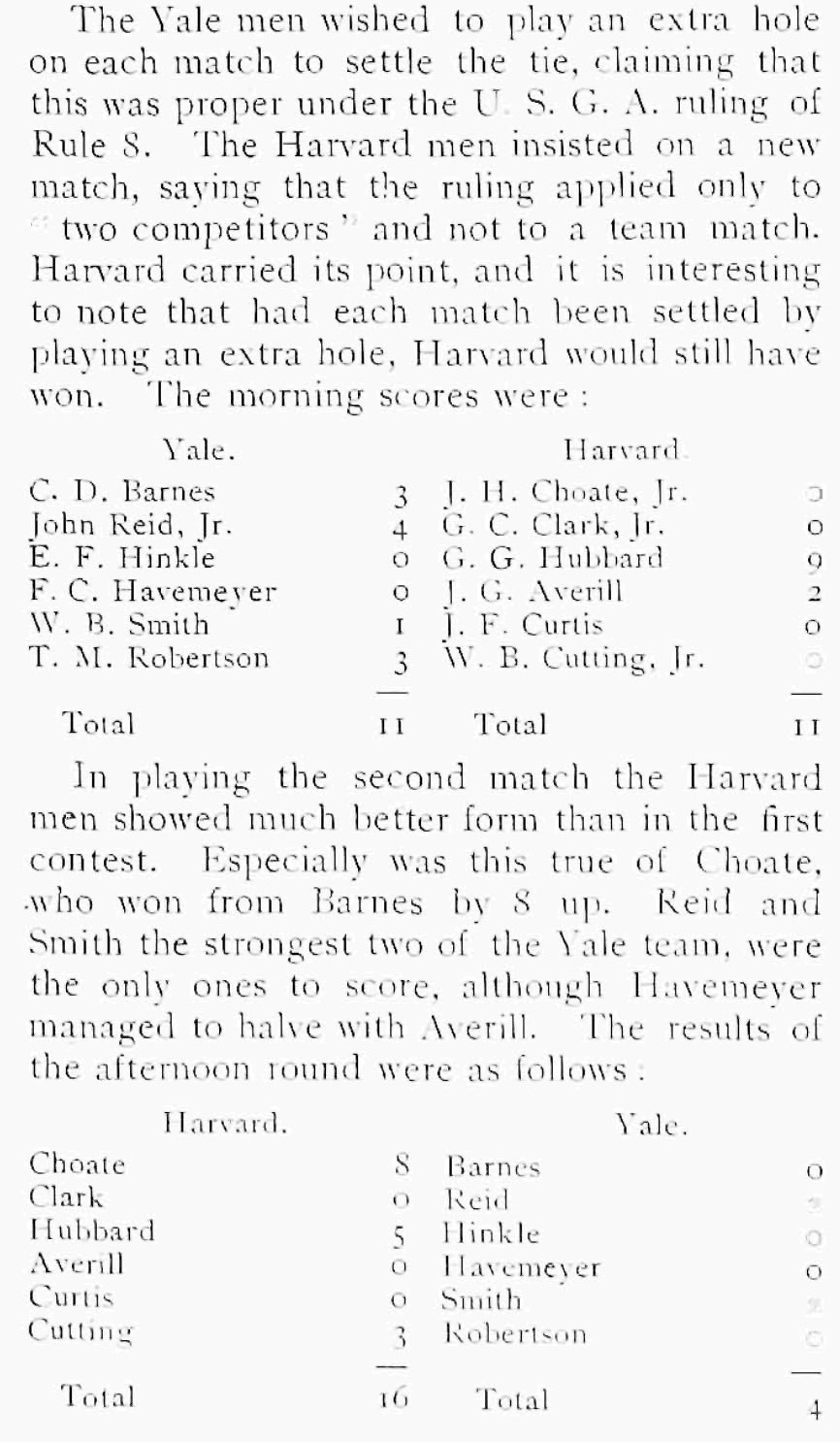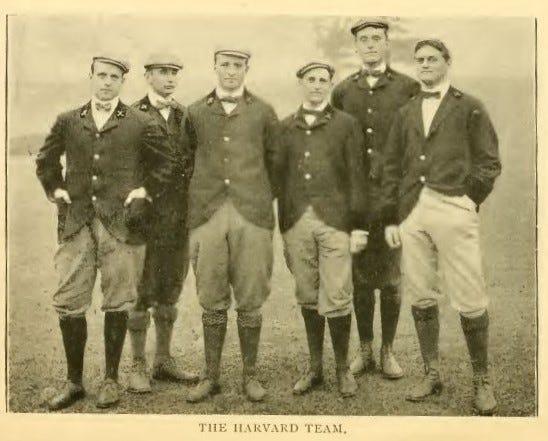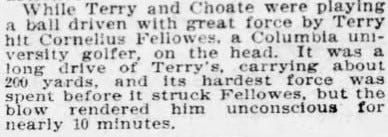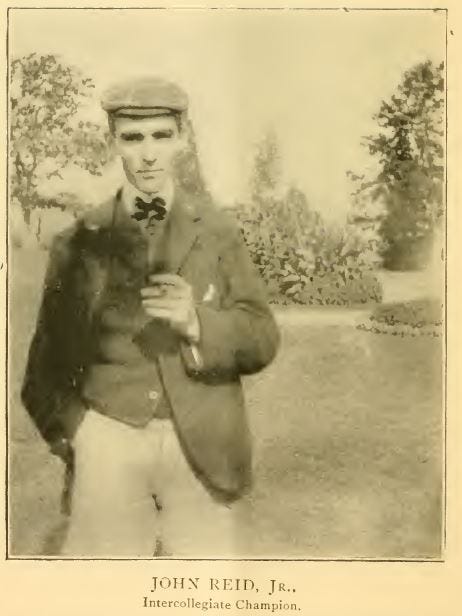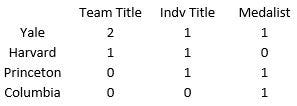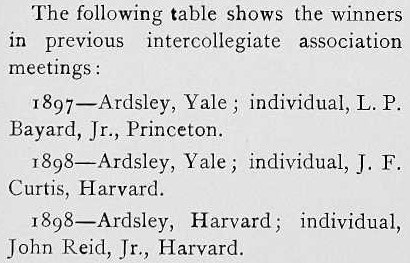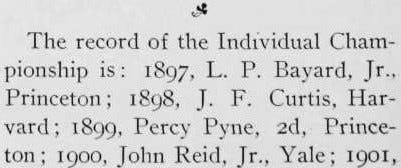This is part of a series on the Men’s Collegiate Championships
IGA Championship Era: 1897-1938
There’s something especially moving about Fall golf, particularly in the northeastern area of the United States where that short window between the leaves changing colors and that first heavy snow will make even Southerners downright sentimental. It’s no accident that this time of year is championship season for golf.
Shortly before the start of the 3rd (can we still call it annual?) Intercollegiate Golf Championships at the end of October, Ardsley was host to the 4th annual Women’s Amateur Championship. Beatrix Hoyt won her THIRD consecutive title, first medaling with a score of 92 and then dominating the match play portion. This result from another successful national championship had the host club buzzing by the time the college boys returned, Yale chasing history and all of them chasing that glory that collegiate team sports provides.
Intercollegiate Championship #3: Oct 26-29, 1898
At the second annual IGA meeting in the early part of 1898, the officers - students from the universities they played for - decided that the championship was better suited for the Fall. Waiting ~18 months for the next event seemed like a terrible option, especially for those players set to graduate in May 1899, so instead they decided to double up championships in the current year. Looking at the list of players who would have missed out on their third championship, the decision seems like a rather obvious one.
The two favorites - Harvard and Yale - looked a little different just a few short months after the last championship, having lost several key members to graduation. Yale entered the tournament with yet another US Amateur Championship runner-up (Walter B Smith) on the 6-man squad to go along with their heavily-favorited captain, John Reid Jr, who had recently lowered the course 18-hole record (again), going around in 82. The Harvard lineup was not lacking in depth, however, and they had their own heavy hitter in captain, Joseph Choate Jr, medalist in the recent US Am.
Format
Team match play (4 teams, 6 players each, net holes scoring, random draw)
Individual stroke play qualifier (18 holes)
All 18 holes now finished at Ardsley so played course once through
Individual match play (8 players, also random draw)
Results
Team Champ: Harvard (1)
The random draw brought a slightly different bracket than in past championships, however Yale and Harvard skated (swam would be a better metaphor given the rain) to another final matchup. This year’s Final was easily the most exciting in the 2.5-year history, coming down to the final hole and two final putts:
TIE-BREAKER:
So now the teams were in uncharted waters (nailed it!) needing to decide how to go about breaking the tie. Of course they didn’t agree, but it turns out it wouldn’t have mattered. As a group they finally decided to proceed with the planned stroke play qualifier in the afternoon, using those scores to count towards another 18-hole net holes match. Harvard won a close but convincing match for their first title, denying Yale permanent possession of the Ardsley Cup for at least one more year.
If you look at the breakdown of points you’ll notice something interesting: this would have been a win for Yale in regulation had it not been for Harvard getting a blowout win from Hubbard. Something to keep in mind for the future.
Medalist: Cornelius Fellows Jr [Columbia]
While the Harvard and Yale players were busy fighting each other, Columbia’s Cornelius Fellows cruised around the course and set a new tournament SP record going 40-43 for an 83. Now all four participating teams had earned a championship award of some kind.
Call it fate, call it karma. This win had to have been extra sweet for Fellows who just a few months prior had not only missed out on match play, but also had been knocked out by a Roderick Terry Jr drive. Details of the event are sparse, but it seems that Fellows was struck in the head while watching the epic first round (Quarterfinals) match between the two captains and IGA officers - Terry [Yale] and Joseph Choate Jr [Harvard].
Individual Champ: John Reid Jr [Yale]
The 36-hole match play Final between John Reid Jr and Walter B Smith guaranteed Yale its first individual champion. The intercollegiate finals was a rematch of the recent Yale university championship which Smith won, earning him a spot on the team for this intercollegiate championship. Captain Reid’s 6&5 victory capped off a perfect record in match play (went 2-0 team matches, 5-0 total) as he became the first runner-up to later capture a championship. What a way to wrap up a collegiate career, earning a title he felt destined to win from the beginning, making the most of an opportunity he wouldn’t have had if the IGA had postponed this championship until the fall of 1899.
Championship Award Count
EXTRA HOLES: Record Book Mix-up
In the previous post we touched on the fact that the results for the 2nd and 3rd Intercollegiate Championships appear in reverse order in the NCAA record book (as of 2022), and that this was an issue dating back to at least 1909. One theory on this issue is that the double championship along with the (spoiler alert) cancelled tournament for 1900 caused a great deal of confusion which some national publication got wrong somewhere along the way, and just was never properly sorted out. There are hints in newspaper accounts throughout the IGA’s existence that they were aware of certain playing records - suggesting that a record book or list of results may have been kept - however, no definitive document from the student-run organization has yet surfaced. It seems that if such a thing existed, it should not have been difficult to correct the misconception, yet the inconsistency had persisted for over a century until the NCAA’s recent correction just this year.


If the Chick Evans Bowl - trophy created in 1940 awarded to the individual winner which we’ll discuss in detail later - is ever found again, we would be very curious to see if the names for the Spring and Fall winners are also reversed.
[Mysterious music plays as an outro]
Thanks for reading!
Up Next: Tournament on the Move
In the next post we will cover Intercollegiate Championship #4, the first held at a different location. There’s also an interesting new development in the tournament resulting in some official documentation.




